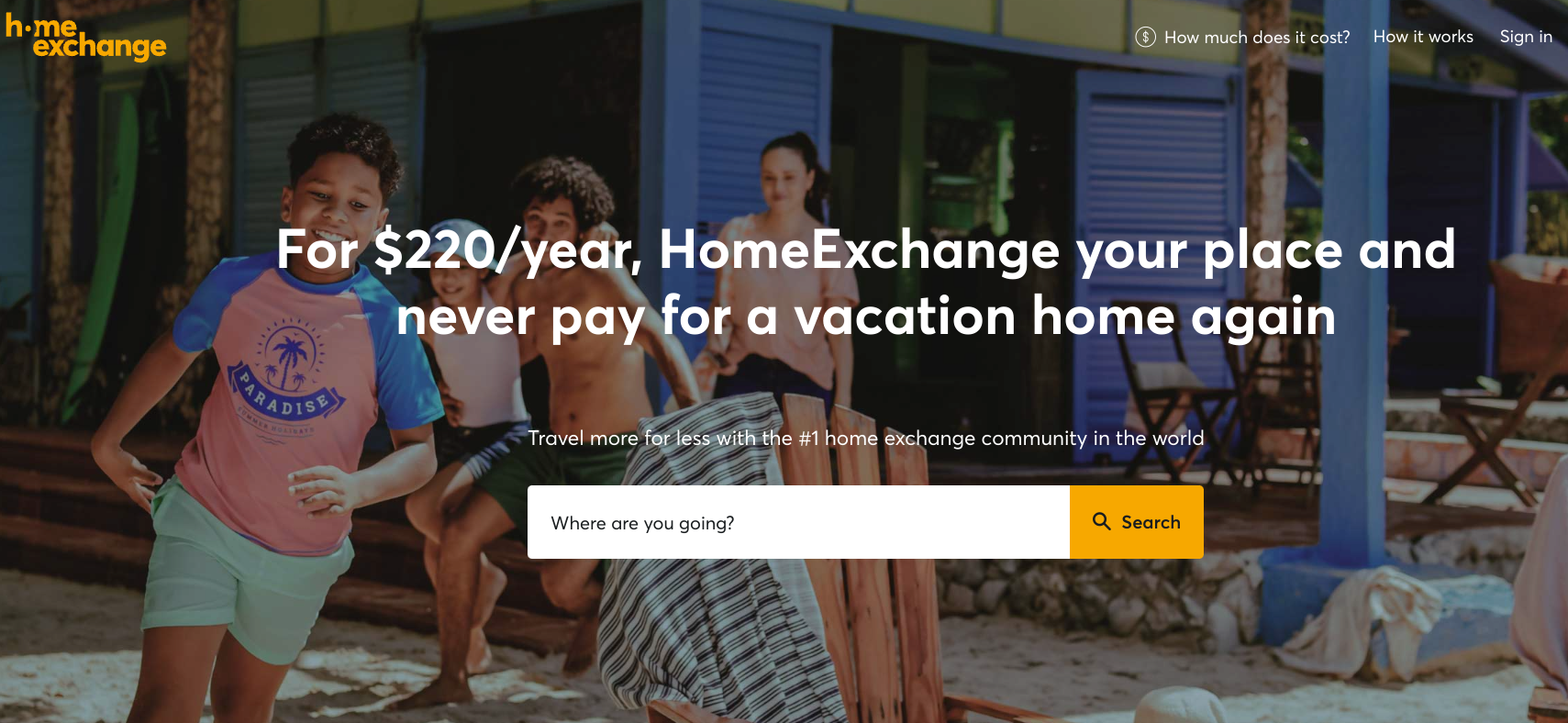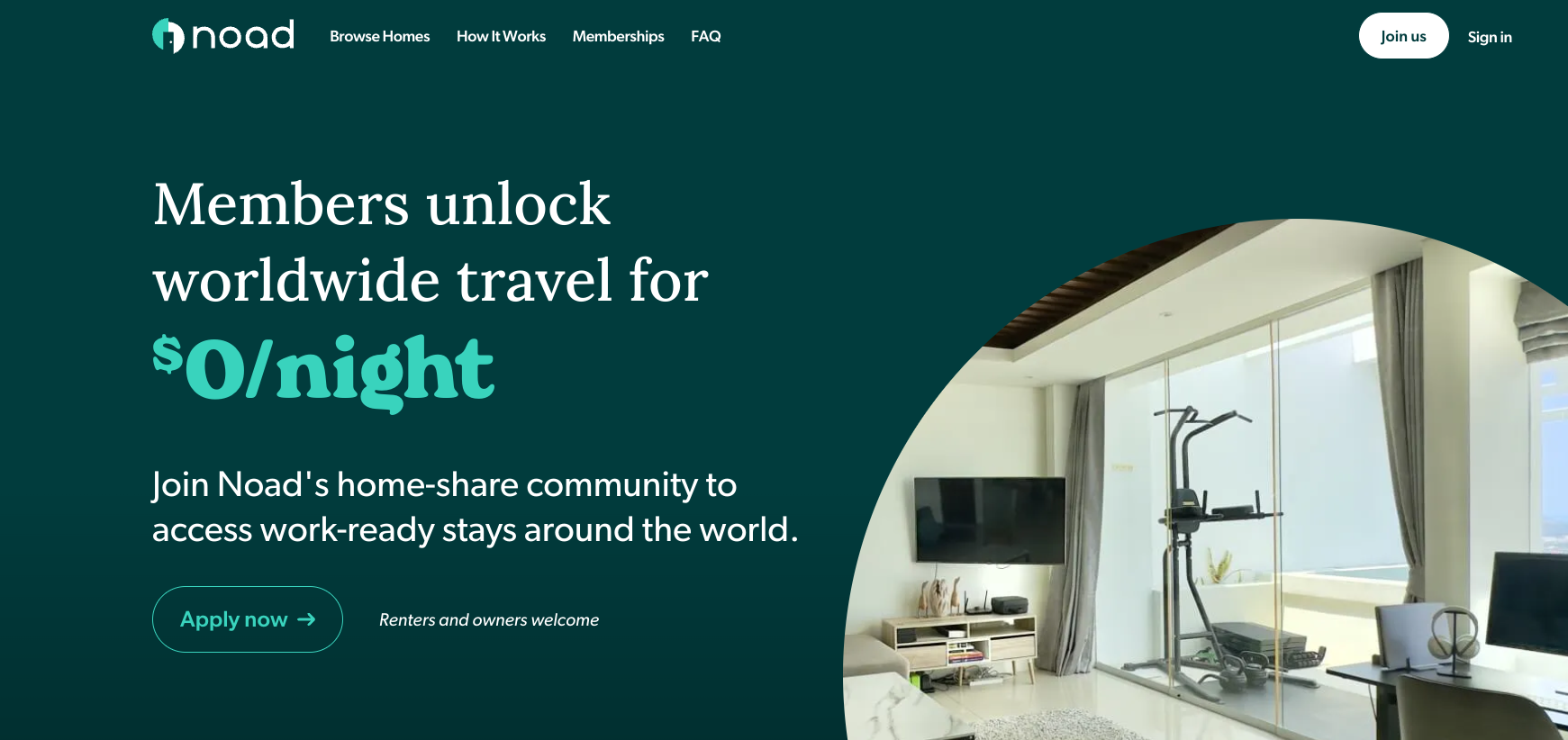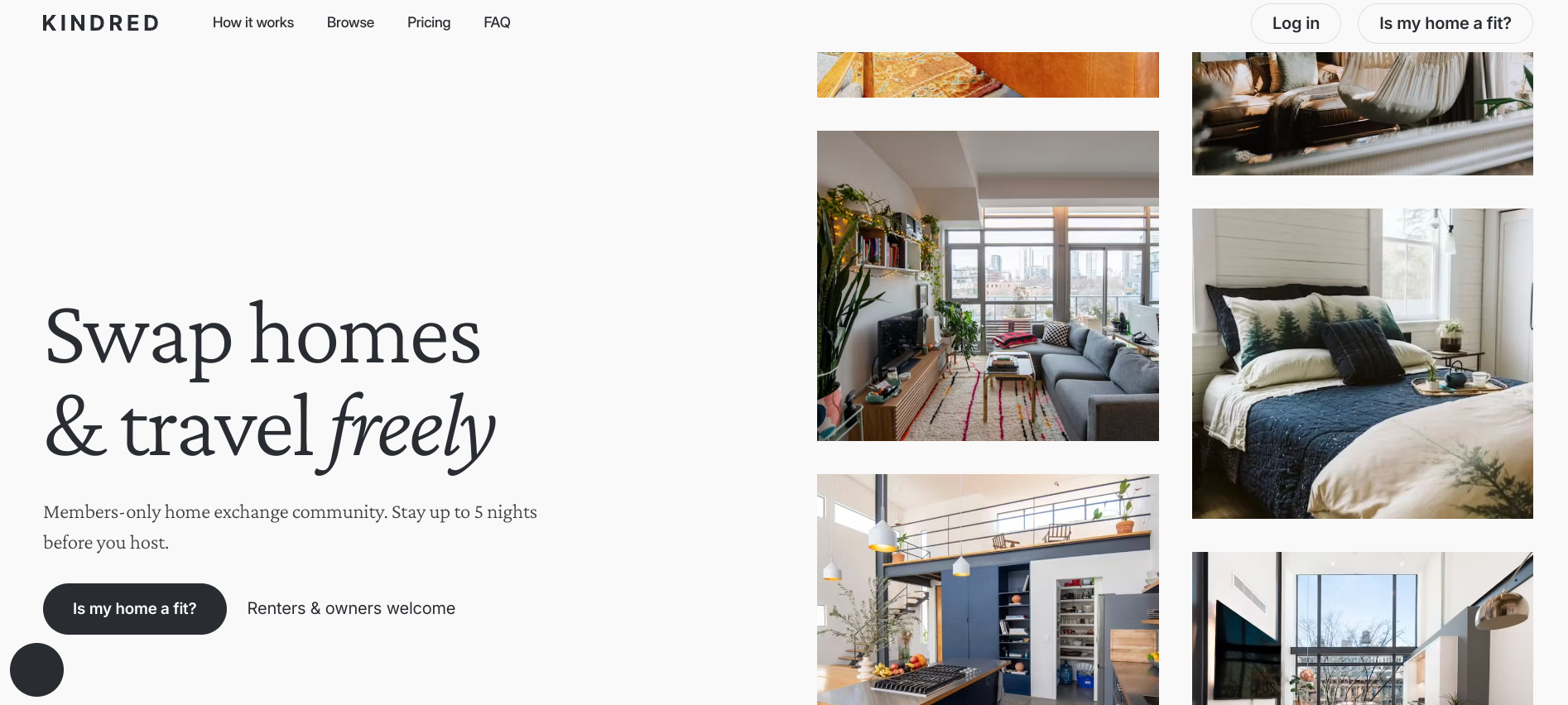Figuring out where to stay as a queer nomad can be tricky. Short-term housing is expensive, and major platforms like Airbnb aren’t always the most ethical option for digital nomads. Not only are destinations like Barcelona cracking down on short-term accommodations due to overtourism, even hostel chains that cater to remote workers (like Selina) are struggling to stay afloat in today’s economy.
Housesitting and homeswapping can be a great way to spend time in new locations without having an unwelcome impact on the housing market - or your budget. Depending on which site you use, you may be able to find a place to stay whether you’re a renter, owner, or full-time traveler.
Here’s what queer nomads need to know about housesitting and home exchange sites, which ones to sign up for, and how to get the most out of your membership.
Housesitting vs. Homeswapping
First, what’s the difference between housesitting and homeswapping? Although there’s some overlap between the two concepts, and some digital nomads may be a good fit for both, there are a few key differences to keep in mind:
- Housesitting (which may include petsitting) involves staying at someone’s home in return for taking care of their house or pets while they’re away. This might include things like watering the garden, bringing in the mail, walking the dog, or feeling the cat. Housesits are usually unpaid.
- Homeswapping, or home exchange, means staying at someone’s home in return for letting people stay at your house at the same time or on other dates. You may be expected to leave the home in the condition you found it (i.e., take out the trash and clean the sheets) or pay a cleaning fee.
Most sites have similar guidelines, but there can be some variations in how much they cost, how new members are vetted, and how many homes are available in different regions.
6 Best Housesitting and Homeswapping Sites
Housesitting and homeswapping sites have been around for decades, but not all of them are a good fit for digital nomads. After all, if you’re planning to work from home, you need more than a place to sleep: you need a comfortable desk, solid Wi-Fi, and a quiet work environment. You may also want to be close to cafes or co-working spaces where you can meet other digital nomads.
Here are our picks for the four best housesitting and home exchange sites that accommodate remote workers and full-time travelers:
TrustedHousesitters

TrustedHousesitters is one of the most active and extensive housesitting networks on the planet - and I know because I’ve used it. In just a couple of years, I’ve lined up over a dozen housesits in cities like San Francisco, Portland, and Sydney. Most of the sits on TrustedHousesitters are petsits, and require you to take care of dogs or cats, anywhere from a few days to a few months at a time.
In addition to major cities, you’ll find housesits in far-flung locations like the Sacred Valley (Peru) and the Galapagos Islands. I filter my search results to show sits with cats, since they’re more compatible with my work routine. You can also filter search results based on factors like house or apartment, city or countryside, and whether or not the location is accessible by public transit.
For popular locations, you’ll need to get in quick, because listings can only receive five inquiries before they’re temporarily closed to new applications. Before confirming a sit, it’s a good idea to have a call or video chat with the homeowner or “pet parent” to make sure you’re on the same page about how often you’ll need to be around, whether they expect photos or video updates, etc.
Not all hosts are accepting of digital nomads. Despite the tagline of the site being “freedom to travel,” some hosts will only accept local housesitters who are available to meet in person. Look for sits that offer high-speed WiFi and a “dedicated workspace” to find the most remote-friendly listings.
Membership fee: Prices for sitters range from $129 USD for a Basic membership or $259 for a Premium membership. Premium members get sit cancellation insurance (up to $150 per night or $1,500 per sit) and two free airport lounge passes, making this a good choice for digital nomads.
Application process: TrustedHousesitters will verify your identify against a government-issued ID, and run a background check if you’re a U.S.-based sitter. You should highlight your previous experience on your profile, and request references from people who can vouch for you as a sitter.
HomeExchange

HomeExchange is a website that allows you to “swap” homes with people around the world by letting other members stay at your home - either at the same time or on a different occasion. This is a good option if your house or apartment will be unoccupied while you’re away.
HomeExchange welcomes both owners and renters, and you’ll find homes of all levels of luxury, from apartments to vacation homes. It’s also possible to list a single room in a shared apartment.
Homes are priced with “guest points” (GP) based on the location, number of bedrooms, and amenities like an on-site gym or pool. A two-bedroom house in a major city might be 180 points per night, while a vacation home might be valued at 250. A small apartment could be anywhere from 50 GP and up.
Let’s say you want to stay at Noah’s apartment in Rome while he stays at yours in Amsterdam. Since this is a reciprocal exchange, no points will be exchanged. If you let Noah stay at your home while you travel elsewhere, you’ll earn GP based on the value of your home that you can use later.
The great thing about HomeExchange is that you can start traveling even before anyone stays with you. You’ll get points for signing up, filling out your profile, and referring a friend. I’ve spent around 10 nights in Portland, Seattle, and Vancouver, even before hosting any guests of my own - well worth the value of an annual membership! While you can’t buy guest points, you can top them up if you’re a little short.
Membership fee: $220 USD per year; only pay when you line up your first exchange. HomeExchange covers you for up to $120 USD per night if your exchange is cancelled at the last minute, and covers property damage up to $1,000,000 USD (after $500 deductible).
Application process: When you sign up, you’ll need to verify your ID and provide proof of address in the form of a lease, utility bill, or another document. You’ll also want to upload high-quality pictures of your home so people know what to expect when they stay with you.
NoadExchange

NoadExchange is a home exchange site that caters specifically to digital nomads. That means every home or apartment is already set up for remote work, so you’re more likely to have a sit-stand desk, ergonomic chair, and desktop monitor - and the WiFi speed is displayed in every listing.
Each home costs 1 credit per night, so there’s no need to calculate guest points the way you do on HomeExchange. There’s also a cleaning fee of around $75 that varies by listing. Like HomeExchange, you’ll get credits just for signing up and creating a listing. I’ve already lined up stays in Budapest and Vienna, and still have a few credits left over!
NoadExchange is a newer and smaller network than Home Exchange, so you’ll have less homes to choose from, and other members may not be as experienced with the home exchange process. For example, I found that members didn’t update their availability as often or respond as promptly.
Still, NoadExchange fills an important niche in the home-swapping community, and is likely to gain in popularity as it adds more destinations.
Membership fee: Memberships start at $150 per year and come with 5 credits.
Application process: Noad Exchange vets new members with a video call to ensure that your listing is accurate and that you share the community’s values. You’re also encourage to have a video call with your host or guest before confirming an exchange.
Kindred

Kindred is a home exchange site that’s currently accepting applications from people in Europe and North America. Although it doesn’t cater to digital nomads specifically, it markets to a hip, young demographic, many of whom are likely remote workers.
Kindred doesn’t charge a membership fee; instead, you’ll pay a cleaning fee and service fee each time you stay in another member’s home. For example, a 5-night stay in San Francisco incurs a $150 service fee and a $300 cleaning fee. Although this might be cheaper than booking a hotel or Airbnb, it’s more expensive than other home exchange platforms.
Members start with 5 credits, which you can use for non-reciprocal exchanges. Once you’re approved as a host, Kindred will send you linens, towels, and toiletries, and you can schedule a photography session for your listing. They also coordinate the cleaning service after each stay.
Members are covered for up to $100,000 in damages, and up to $250 per night if a host cancels their exchange. I haven’t used Kindred yet, but I’ve signed up for the waiting list.
Membership fee: No membership fee; pay a service fee and cleaning fee per trip.
Application process: You’ll need to apply for membership and verify your identify; only homes that meet Kindred’s Property Requirements will be considered. If you’re accepted, you’ll get an onboarding call and access to a members-only Slack channel.
Homoway

Homoway Home Exchange is a new home exchange platform specifically for the LGBTQ+ community. Founded by Spencer Blank in Portland, OR, Homoway aims to “build a community of queer adventurers” by creating a queer-friendly home exchange network all over the world.
Homoway is still in beta, so we don’t have all the details, but it appears to work just like other home exhange sites, with the options for reciprocal and non-reciprocal exchanges.
Membership fee: TBD
Application process: Apply to join the beta program and commit to traveling and hosting “at least once with another member of this program within a 6-month time frame of your profile confirmation.”
Quouch

Quouch is less of a home exchange platform and more like Couchsurfing for queers. It was created by co-founders Nora and Lisbeth to prioritize the needs of women and queer people. For now, it’s an invite-only platform, and members are requested not to share the code with “cis, straight, dyadic (non-intersex) men.”
Most likely, your host will be present during your stay, although you aren’t obligated to spend time with each other. Ideally, they’ll give you a queer-friendly welcome to their city and introduce you to the local LGBTQ+ scene.
Quouch has filters to help BIPOC, neurodiverse, gender non-conforming, and other identity groups find each other, and is developing a “Humor Test” to help facilitate matches. Quouch isn’t a dating app, and has strict community safety guidelines.
Membership fee: TBD
Application process: Request an invite code by filling out a short form telling Quouch a little bit about yourself and why you want to use the platform.
3 Things to Consider Before Housesitting or Homeswapping
Housesits and home exchanges can be a great way to travel the world on a budget. But there are a few things to keep in mind before housesitting as a digital nomad. Follow these three tips to get started:
1. Be informed when crossing borders
Many housesitters travel internationally without any issues, but some destinations are stricter than others about whether housesitting counts as “work”. TrustedHousesitters claims that only 0.02% of housesits in 2023 resulted in “border control issues,” but some sitters have been denied entry to countries like the U.S. and Canada because they intended to housesit there.
Not all countries are so strict, and there are plenty of digital nomad destinations where you’re unlikely to have any issues. Still, it’s worth looking into the rules around housesitting in your destination, and only accept housesits in countries where you won’t be violating your visa.
Consider booking paid accommodation for the beginning of your trip, and only confirm a housesit once you’re safely across the border.
2. Check the terms of your lease
Leases are another grey area when it comes to housesitting and homeswapping. Although many home exchange sites welcome renters, and clarify that home exchanges aren’t technically “sublets” or “short-term rentals,” your landlord or management company may disagree.
Read the fine print of your lease, and consider asking your landlord for permission, especially if you’ll be hosting a lot of guests while you’re away. Consider installing a lockbox so guests can access your keys when they arrive without having to bother your neighbors.
3. Plan ahead (and update your calendar)
As a digital nomad, it can be tough to balance your desire to see new places with the appeal of secure accommodation. Should you focus on short-term housesits or long ones?
You’ll get more value out of housesitting by choosing longer housesits or by lining up multiple housesits in a row, rather than traveling to a new place every week. On the other hand, even a small gap between housesits in a major city can break your budget if you have to pay for short-term accommodation.
Try to alternate between housesits and home exchanges so you can get a break from the responsibility of housesitting. I managed to line up a dozen back-to-back housesits this spring and summer; when I had a break between housesits, I used my points on home exchange sites to fill in the gaps.
Keep your calendar updated so other members know your availability, and don’t get discouraged if you don’t line something up right away. It can take time before all the pieces fall into place!
Photo credit: Karollyne Videira Hubert

